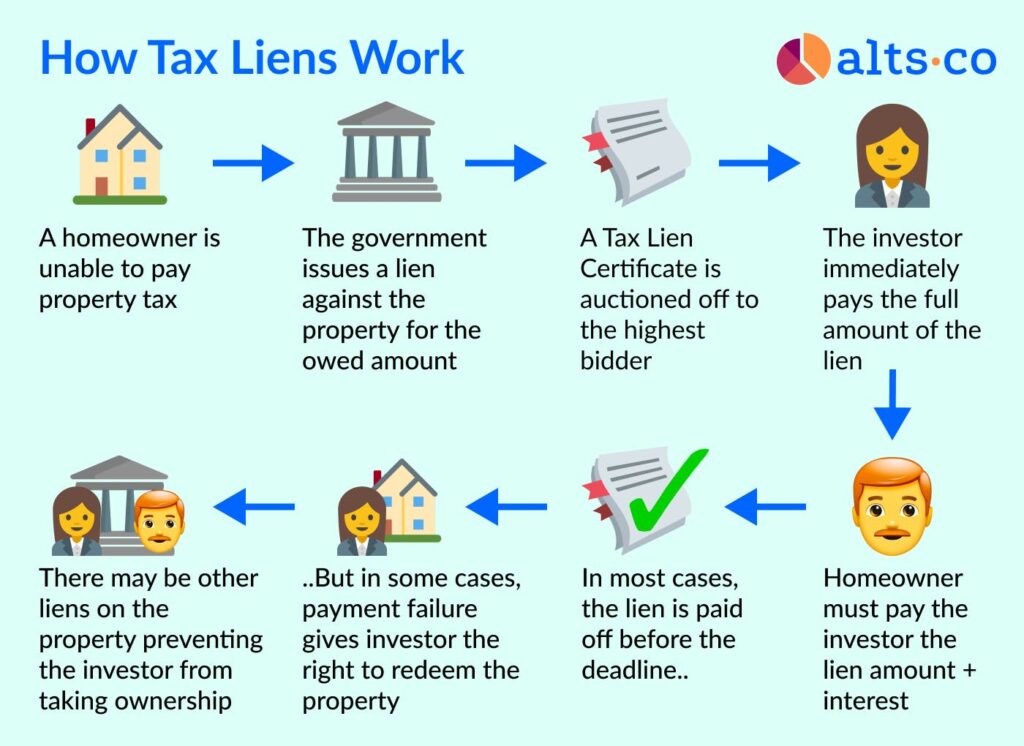All Categories
Featured
Table of Contents
If you have an interest in the tax lien foreclosure process, you must speak to an attorney so you recognize and consider the dangers of this sort of investment. - tax lien investing risks
Tax obligation lien sales are one method that cities and regions attempt to recover a few of the general public bucks they've invested preserving these homes abandoned by personal proprietors. As we'll clarify in this article,. When home taxes are considered overdue, regional federal governments usually focus on giving notification of delinquency and trying to accumulate the unsettled amounts from the owner.
Nonetheless, this procedure normally takes years. If a proprietor has actually left and hesitates to pay tax obligations or maintain the building, the city must spend tax bucks to keep the residential or commercial property. These costsboarding up the building, trimming thick turf and weeds, reacting to fire and cops gets in touch with the building, and moreadd up

Proprietors who have fallen on tough times absolutely need every initiative to maintain them out of misbehavior and in their homes. Usually, if the residential or commercial property is uninhabited and tatty, we have to think the owner has actually selected to abandon their passion in the residential or commercial property and that they are "unwilling" to pay (though scenarios earlier in the process may have required their hand).
How Tax Lien Investing Works
Take, for instance, a single-family home where the owner has actually long considering that strolled away. For many years the neighborhood federal government has actually needed to step in and get rid of waste dumped in the backyard, board up the doors and home windows, and respond to calls about immoral activity on the building. All these solutions cost the neighborhood government taxpayer dollars.
In lots of states, those costs can be gathered likewise as the unpaid tax obligations, yet not in all. (Something that Area Development strongly supports for.) Eventually, the complete financial obligation comes to be higher than what the residential property can sell for. In a tax lien sale (or tax obligation certification sale) the regional government normally holds a public auction where the winning prospective buyer consents to pay one of the most money for the right to enforce the tax obligation lien, beginning with a minimum bid of at the very least the taxes had, plus applicable passion, charges, and expenses.

When a government markets the tax lien they are generally marketing to a private customer the city government's authority to accumulate the financial debt for in advance repayment of the tax obligations owed. The buyer's acquisition normally consists of the ability to gain future passion, along with recoup relevant costs and costs sustained by the buyer, if the residential property proprietor pays the tax financial obligation.
This is, basically, privatization of a core federal government function: taxation. Tax obligation lien sales are particularly poor when it comes to uninhabited, deserted, and shabby residential properties because they lengthen the period prior to a building can be relocated into the hands of a new, a lot more responsible proprietor. Exclusive tax lien purchasers hold the debt, yet they do not own the titlethe legal right to ownership of the propertyand in many situations, they have no passion in obtaining it.
Tax Lien Real Estate Investing
Taking into consideration spending plan cuts, city governments in numerous states have minimized internal real estate tax collection and enforcement efforts and wanted to tax lien sales as a fast infusion of revenue - tax lien investing (profit by investing in tax liens). Several counties choose or are mandated by the state to offer tax obligation liens because it contracts out collection and often generates very needed cash earlier in the collection process
By transferring the regional federal government's passion in and enforcement of the tax obligation lien to an exclusive buyer, city governments lose much of their adaptability: flexibility to acquire vacant buildings that the private market doesn't desire, or to aid the proprietor prevent shedding their residential or commercial property. With vacant properties, there is a much greater possibility that the private buyer isn't curious about the home itself.
Tax obligation lien sales can create harm in traditionally disinvested areas. In a depressed real estate market, less owners are able to redeem the amount of the financial debt sold to a tax lien purchaser. These areas are ripe for a different type of tax obligation lien investorspeculative proprietors seeking to obtain buildings on the inexpensive by confiscating on the real estate tax lien, bleeding what little bit equity is left by renting out a low quality property to susceptible lessees, and after that abandoning the building when they've gained back their financial investment.

Not all state regulations provide regional governments the power to interfere in this cycle. In any case, the residential or commercial property stays uninhabited and in limbo, all the while imposing considerable expenses on its next-door neighbors and taxpayers. It's easy to understand that lots of city governments transform to tax obligation lien sales due to the fact that they assist money important civil services.
If the neighborhood federal government instead markets the residential property (also known as the "tax obligation deed"), rather than the tax obligation debt, then they are in control of what happens to the property and the enforcement process if the proprietor continues to not pay the real estate tax owed. The federal government will supply the owner a reasonable time to repay the tax obligation debt, after which the federal government will confiscate its passion in the tax lien and the owner's right of redemption.
From their inception, these auctions were locations for financiers to profit through exploitation. In very early 20th-century cities, notorious "tax sharks" like Chicago's Jacob Glos and New york city's Charles Wiltsie amassed ton of money by buying up ratings of tax obligation liens on residential properties, charging their proprietors expensive total up to get rid of the lien, or waiting until the due date for negotiation passed and claiming the action.
Is Buying Tax Lien Certificates A Good Investment

Phone call to abolish tax lien sales and overhaul tax misbehavior legislations have actually regularly emerged. Frequently, they have been available in reaction to instances of inadequate, often elderly homeowners who shed their homes to unethical tax buyers over tiny tax debts. But with a few exceptions, state legislatures have stood up to architectural reforms.
Those who have paid off their home loans (mostly seniors or persons that had actually inherited a family home) need to additionally discover the cash to pay building tax obligations. This explains why 70 percent of the homes cost tax lien sales are had outright. It is well past time for states to adopt a more humaneand much more effectivesystem for building tax obligation enforcement.
Latest Posts
What Is Property Tax Sale Auction
Tax Defaulted Property Auction
Delinquent Tax Lien